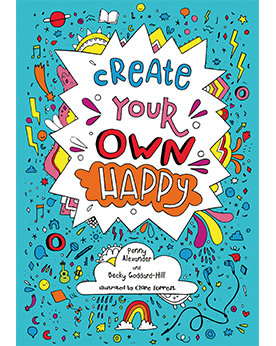This article has been written by parenting blogger and co-author of Create Your Own Happy and Be Happy Be You Becky Goddard-Hill.
Journaling is the writing down and exploring of thoughts and feelings. It has increased in popularity over recent years, as we have begun to see its benefits in terms of mindfulness and emotional well-being.
Basically, when you sit, pen and paper in hand, focused on writing how you feel, you are very firmly in the present. You are not worrying over yesterday, nor fretting about tomorrow. Your mind isn't wandering all over the place. No, you are attending to what is going on for you right now, focused on the present moment and paying attention to how you feel. This is mindfulness, being in the now and letting your mind settle.
So why is journaling for mindfulness useful for kids and why should parents encourage it? Well, through journaling they are forced to slow their busy buzzy brains down and listen to their thoughts and feelings and give them space to be explored.This can help kids gain clarity and insight into what they feel and help them make better decisions. Journaling has been shown to help people de-stress, eat healthier, feel calmer and boost self-confidence. It therefore makes a great well-being boost for kids.
If feelings remain bottled, it can make kids feel tense and stressed and eventually those feelings burst out anyway - often in an unhelpful or inappropriate way. Journaling gives a safe time and space to this emotional expression and this mindful practice helps kids to calm down.
So now we know all the benefits of journaling, how can you, as a parent, encourage it at home?
Here are a couple of tips:
- Explain there is no right way to journal. It doesn't have to be neat or orderly or take essay form. Some people draw, some mind-map, some doodle some just write; it can be different for everyone.
- Great stationery is always very inviting, perhaps you could take your child to choose a journal they will love to write in. Stickers, pens and scrap materials can all be used in journaling and can be a great way for kids to get creative.
- It can be hard to write how you feel if you think it is going to be seen, so do let your child know you will respect their privacy and help them come up with a place to keep their journal safe and away from nosy siblings.
- Perhaps you could begin journaling too - young people are far more likely to see our advice as credible if we do it ourselves.
- Finally, encourage your child to journal through prompts. For example, if discussing a problem they are having, you might suggest they write down how they feel about it or mind map possible solutions.
Learning to process and attend to feelings is a great tool for emotional well-being and if children establish this early, it can be a benefit to their emotional health throughout their life.
The beauty of journaling is that it is both simple and accessible. It requires only pen, paper and attention, can be done anywhere and is cost free and therapeutic. It is the perfect well-being tool and should absolutely be encouraged.
Not sure where to start with journaling? Check out the titles below for some inspiration - packed with exercises and activities designed to help kids boost their happiness and better understand their emotions:
For ages 7+ Create Your Own Happy and ages 12+ Be Happy Be You


